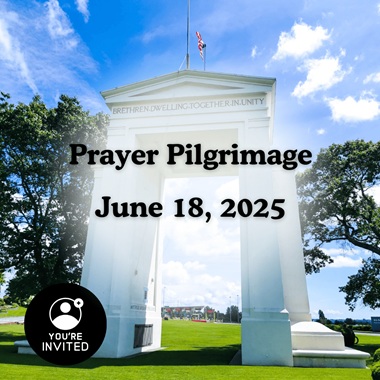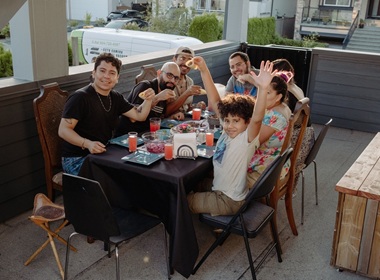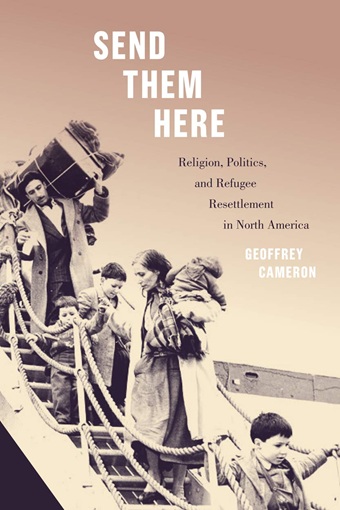
June 20 is World Refugee Day 2025, and local groups are recognizing that fact in several ways.
This is a good time to remember the leading role that Christians, churches and their networks have taken in welcoming refugees – both now and in the past.
The Network of Churches Welcoming Refugees is participating with IAFR Canada and Journey Home Community in a Prayer Pilgrimage June 18.
This is what they will be doing:
A pilgrimage is a journey that is spiritually motivated. Pilgrims stop to pray, worship and reflect along the way. This particular pilgrimage is intended to bring people together to be physically present in a strategic place for refugees – the Canada/US border.
It is a time set apart to intercede and to actively listen to God and the new neighbours we meet along the way.
This day of pilgrimage, in such a liminal space, will be a rhythm of learning, praying and reflecting. We’re excited to see all that God will do as we spend this day together, in honour of World Refugee Day 2025.

Journey Home runs Welcome Homes which offer short term housing, followed by support to move into more permanent homes.
The three groups involved have extensive involvement with refugees and refugee issues:
- Journey Home Canada: Birthed out of a Willingdon Church community group 20 years ago, they offer Welcome Homes (permanent, transitional), Meanwhile Spaces (temporary, transitional) and Communities of Welcome. They also host regular Welcoming Refugee Claimants Orientation sessions (one this weekend).
- IAFR Canada: The International Association for Refugees was established in response to the need for an international Christian non-profit agency devoted to the mission of helping people survive and recover from forced displacement. They do this in partnership with local churches, refugees around the world and the church-at-large. IAFR Canada operates in partnership with The Peoples Church in Toronto.
- Churches Welcoming Refugees: The network connects churches, agencies and individuals to support refugees through resourcing, equipping, collaborating and advocacy. This initiative began with a gathering of over 100 people in February 2023, organized by CityGate Vancouver and hosted by agencies and churches, including Kinbrace, Journey Home, Inasmuch, Tenth Church and St. John’s Vancouver. Since then, the network has hosted multiple gatherings, both virtual and in-person. In February 2024, over 80 participants convened to explore housing solutions, forming groups to pursue short-term, transitional and long-term housing initiatives.
Tenth Church
Tenth Church is celebrating June as Refugee Friendship Month. They have been “welcoming refugee claimants into friendship, housing and a community of hope since 2016.”
Here are two of their main focuses:
- Housing
Thanks to valuable partners and generous congregants, Tenth Church is able to welcome newcomer refugee claimants into a number of homes and offer them temporary housing (3 – 6 months). Welcomed families are supported with groceries, transportation and essentials. As they embark on their road to resettlement, we share their journey by offering friendship and practical support.
- Community Life
We believe there is a healing and transformative power in feeling a sense of belonging and being connected to others. In serving our community of 400+ refugee claimants, we organize regular gatherings, events and meals. Our prayer is that we can become a community of hope for all.
Tenth is seeking more volunteers and financial support.
Kinbrace

Image on the Kinbrace site.
Alex Dawley, Donor Engagement and Communications Officer at Kinbrace Refugee Housing & Support, emailed supporters June 9, saying:
We are writing you today to share our deep concern about Bill C-2: The Strong Borders Act. This is a newly proposed border bill proposed by the Canadian government, and if passed, will deny protection to those at risk of persecution or torture.
Seeking asylum is a human right. . . . Bill C-2 is a direct attack on this right. We have witnessed the profound mutual transformation and community impact that is possible when those seeking protection are welcomed in Canada. This new border bill proposes significant changes to existing rules around border security, avenues to seek asylum, customs and law enforcement. It worries us for a variety of reasons.
Firstly, it would make it virtually impossible for many refugee claimants entering Canada from the US to make a claim at all. This is a violation of our obligations under international refugee protection law.
Further, Bill C-2 ignores the complex reasons people seek refuge and fails to consider the unpredictability of global conflict. It would tear apart families and communities – a devastating and cruel reality we have already been witnessing elsewhere in North America.
We believe everyone deserves a chance to live in safety and dignity. Bill C-2 undermines that chance.
So many other churches and ministries in this area are working with refugees and asylum seekers that I cannot name them all.
Send Them Here

A good resource for anyone thinking about these issues is Geoffrey Cameron’s Send Them Here: Religion, Politics and Refugee Resettlement in North America (McGill-Queen’s University Press, 2021).
Here are a few quotes to give some sense of the book’s contribution:
Religious and voluntary groups played a central role in humanitarian discourse, refugee relief and immigrant aid long before the advent of refugee resettlement. . . .
As Andrew Thompson notes, the emergence of mid 20th century Christian internationalism promoted “the importance of non-state, person-to-person international relations,” which included a growing concern with refugee welfare.
A footnote to this sentence refers to four books which discuss the way in which missionaries influenced public policy in their home countries: Andrew Thompson: For God and Globe; David Hollinger: Protestants Abroad; David King: God’s Internationalists; and Heather Curtis: Holy Humanitarians.
(I wrote about Protestants Abroad here, along with Jonathan Manthorpe’s Claws of the Panda, which describes a similar phenomenon in Canada.)
Private sponsorship was created as a reluctant partnership between bureaucrats and religious groups, who were granted privileges of sponsorship in exchange for assuming some financial responsibility for settlement.
The first sponsorship agreement was with the Mennonite Central Committee of Canada:
[T]he Canadian resettlement program would not have reached anywhere near the scale it did without private sponsorship and the collaboration between bureaucrats and religious groups . . .
Cameron, a research associate with the Global Migration Lab, Munk School of Global Affairs and Public Policy, University of Toronto and director of the Office of Public Affairs of the Baha’i Community of Canada, concludes the book with these words:
The most powerful communities organized around such ideals have always been identified with religion. Indeed, religious communities have been at the centre of a centuries-long process of advancing a transnational global humanitarian ideal.
Their role within the political enterprise of refugee resettlement cannot be neglected by policymakers or advocates with impunity.
The World Evangelical Alliance calls on churches to observe World Refugee Sunday on or near to June 20 (UN World Refugee Day) and participate in prayer and action, responding in practical ways to God’s call to love the stranger as yourself. The EFC website has general information. Get the latest resources (requires free signup) at iwas.live
